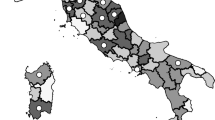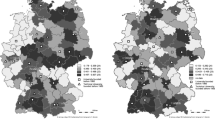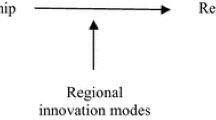Abstract
This paper proposes a conceptual framework in which a historical cultural environment based on scientific knowledge and creativity is an important driver of long-term regional entrepreneurship and innovation. These two factors, in turn, foster the growth of regions. This framework is empirically tested in Italy using current and historical data at the NUTS 3 geographical level and applying structural equation modeling to a system of three equations. The empirical evidence supports the conceptual framework and shows that the cultural environment has an indirect effect on regional growth through entrepreneurship and innovation. Historical scientific knowledge, proxied by the presence of universities, and past creativity, proxied by the presence of scientists and inventors in the area, positively affect long-term regional entrepreneurship and innovation. Regions with higher levels of entrepreneurship and innovation grow faster than other regions. Lastly, entrepreneurship plays a crucial role by also strengthening the positive impact of innovation on growth.


Similar content being viewed by others
Notes
The concept of new combinations of productive means has five different possibilities: (1) the introduction of new goods or a new quality of goods; (2) the introduction of a new method of production; (3) the opening of a new market; (4) the conquest of a new source of supply or of half-manufactured goods, irrespective of whether these sources already exist or are new; and (5) a new organization of any industry, such as the creation of a monopoly position or the breaking up of a monopoly position (Schumpeter 1934, p. 66).
The term “creative destruction” was coined by Schumpeter (1942) to emphasize the role of innovation in economic development.
This view of entrepreneurship can be considered the first entrepreneurship theory of Schumpeter. In later studies, Schumpeter outlined a second entrepreneurship theory, which is basically less “individualistic.” In this second theory, entrepreneurs are not necessarily people, and countries and agendas could also act as entrepreneurs.
Some studies have proxied regional innovation by using composite indicators, commonly including patent data (Crescenzi 2005).
In addition, our model does not include investment in the growth equation because other variables operate, at least in part, through factor accumulation.
Data on the number of universities and their year of foundation are from Wikidata. Information on the number of students came from the Annali di statistica, Statistica dell’Istruzione Superiore nell’anno accademico 1926–1927.
References
Acemoglu, D., Johnson, S., & Robinson, J. A. (2001). The colonial origins of comparative development: an empirical investigation. The American Economic Review, 91(5), 1369–1401. https://doi.org/10.1257/aer.91.5.1369.
Acs, Z. J., & Armington, C. (2004). Employment growth and entrepreneurial activity in cities. Regional Studies, 38(8), 911–927. https://doi.org/10.1080/0034340042000280938.
Acs, Z. J., Audretsch, D. B., & Lehmann, E. (2013). The knowledge spillover theory of entrepreneurship. Small Business Economics, 41(4), 767–774. https://doi.org/10.1007/s11187-013-9505-9.
Acs, Z. J., Braunerhjelm, P., Audretsch, D. B., & Carlsson, B. (2009). The knowledge spillover theory of entrepreneurship. Small Business Economics, 32(1), 15–30. https://doi.org/10.1007/s11187-008-9157-3.
Acs, Z. J., & Storey, D. S. (2004). Introduction: Entrepreneurship and economic development. Regional Studies, 38(4), 871–877. https://doi.org/10.1080/0034340042000280901.
Aghion, P. (2017). Entrepreneurship and growth: lessons from an intellectual journey. Small Business Economics, 48(1), 9–24. https://doi.org/10.1007/s11187-016-9812-z.
Aghion, P., & Howitt, P. (1992). A model of growth through creative destruction. Econometrica, 60(2), 323–351. https://doi.org/10.3386/w3223.
Amatori, F. (1980). Entrepreneurial typologies in the history of industrial Italy (1880-1960): a review. The Business History Review, 54(3), 359–386. https://doi.org/10.2307/3114244.
Andersson, M., & Koster, S. (2011). Sources of persistence in regional start-up rates—evidence from Sweden. Journal of Economic Geography, 11(1), 179–201. https://doi.org/10.1093/jeg/lbp069.
Audretsch, D. B., & Fritsch, M. (2002). Growth regimes over time and space. Regional Studies, 36(2), 113–124. https://doi.org/10.1080/00343400220121909.
Audretsch, D. B., & Keilbach, M. (2007). The localization of entrepreneurship capital: evidence from Germany. Papers in Regional Sciences, 86, 351–365. https://doi.org/10.1111/j.1435-5957.2007.00131.x.
Audretsch, D. B., & Keilbach, M. (2008). Resolving the knowledge paradox: knowledge-spillover entrepreneurship and economic growth. Research Policy, 37, 1697–1705. https://doi.org/10.1016/j.respol.2008.08.008.
Audretsch, D. B., & Lehmann, E. E. (2005). Does the knowledge spillover theory of entrepreneurship hold for regions? Research Policy, 34(8), 1191–1202. https://doi.org/10.1016/j.respol.2005.03.012.
Bae, J., & Koo, J. (2008). The nature of local knowledge and firm formation. Industrial and Corporate Change, 18(3), 1–24. https://doi.org/10.1093/icc/dtn017.
Barro, R. J. (1991). Economic growth in a cross section of countries. Quarterly Journal of Economics, 106(2), 407–443. https://doi.org/10.2307/2937943.
Barro, R. J., & Sala-i-Martin, X. (1992). Convergence. Journal of Political Economy, 100(2), 223–251. https://doi.org/10.1086/261816.
Baumol, W. J. (1968). Entrepreneurship in economic theory. American Economic Review, 58, 64–71 www.jstor.org/stable/1831798.
Baumol, W. J. (1990). Entrepreneurship: productive, unproductive and destructive. Journal of Political Economy, 98(5), 893–921 https://doi.org/10.1086/261712.
Baumol, W. J. (1993). Formal entrepreneurship theory in economics: existence and bounds. Journal of Business Venturing, 8(3), 197–210. https://doi.org/10.1016/0883-9026(93)90027-3.
Baumol, W. J., & Strom, R. J. (2007). Entrepreneurship and economic growth. Strategic Entrepreneurship Journal, 1(3–4), 233–237. https://doi.org/10.1002/sej.26.
Belitski, M., & Desai, S. (2016). Creativity, entrepreneurship and economic development: city-level evidence on creativity spillover of entrepreneurship. Journal of Technology Transfer, 41, 1354–1376. https://doi.org/10.1007/s10961-015-9446-3.
Beugelsdijk, S. (2007). Entrepreneurial culture, regional innovativeness and economic growth. Journal of Evolutionary Economics, 17(2), 187–210. https://doi.org/10.1007/s00191-006-0048-y.
Beugelsdijk, S., Klasing, M. J., & Milionis, P. (2018). Regional economic development in Europe: the role of total factor productivity. Regional Studies, 52(4), 461–476. https://doi.org/10.1080/00343404.2017.1334118.
Bishop, P. (2012). Knowledge, diversity and entrepreneurship: a spatial analysis of new firm formation in Great Britain. Entrepreneurship and Regional Development, 24, 641–660. https://doi.org/10.1080/08985626.2011.617786.
Bonaccorsi, A., Colombo, M. G., Guerini, M., & Rossi-Lamastra, C. (2014). The impact of local and external university knowledge on the creation of knowledge-intensive firms: evidence from the Italian case. Small Business Economics, 43(2), 261–287. https://doi.org/10.1007/s11187-013-9536-2.
Bosker, M. (2009). The spatial evolution of regional GDP disparities in the ‘old’ and the ‘new’ Europe. Papers in Regional Science, 88(1), 3–27. https://doi.org/10.1111/j.1435-5957.2008.00183.x.
Bruton, G. D., Ahlstrom, D., & Li, H.-L. (2010). Institutional theory and entrepreneurship: where are we now and where need to move in the future? Entrepreneurship Theory and Practice, 34(3), 421–440. https://doi.org/10.1111/j.1540-6520.2010.00390.x.
Carree, M., & Thurik, R. (2010). The impact of entrepreneurship on economic growth. In Z. J. Acs & D. B. Audretsch (Eds.), Handbook of entrepreneurship research. Berlin: International Springer Verlag.
Crescenzi, R. (2005). Innovation and regional growth in the enlarged Europe: the role of local innovative capabilities, peripherality, and education. Growth and Change, 36(4), 471–507. https://doi.org/10.1111/j.1468-2257.2005.00291.x.
Del Monte, A. (2019). Il Mezzogiorno d’Italia e il Sud degli Stati Uniti: Due casi di sviluppo a confronto. Catanzaro: Rubettino.
Del Monte, A., & Pennacchio, L. (2020). Historical roots of regional entrepreneurship: the role of knowledge and creativity. Small Business Economics, 55, 1–22. https://doi.org/10.1007/s11187-019-00139-8.
Del Monte, A., Moccia, S., & Pennacchio, L. (forthcoming). Cultural environment, entrepreneurship and innovation in Europe. The importance of history. Capitale Culturale. Studies on the Value of Cultural Heritage.
Erikson, T. (2002). Entrepreneurial capital: the emerging venture’s most important asset and competitive advantage. Journal of Business Venturing, 17(3), 275–290. https://doi.org/10.1016/S0883-9026(00)00062-8.
Fagerberg, J., Srholec, M., & Verspagen, B. (2010). Innovation and economic development. In B. Hall & N. Rosenberg (Eds.), Handbook of the economics of innovation (Vol. 2, pp. 833–872). Publisher: North Holland. https://doi.org/10.1016/S0169-7218(10)02004-6.
Florida, R. (2002). The rise of the creative class. New York: Basic Books.
Florida, R. L. (2004). Cities and the creative class. New York: Routledge.
Florida, R. L. (2014). The creative class and economic development. Economic Development Quarterly, 28(3), 196–205. https://doi.org/10.1177/0891242414541693.
Fritsch, M. (2011). Start-ups in innovative industries—causes and effects. In D. B. Audretsch, O. Falck, S. Heblich, & A. Lederer (Eds.), Handbook of innovation and entrepreneurship (pp. 365–381). Cheltenham: Elgar. https://doi.org/10.4337/9781849807760.00033.
Fritsch, M., & Aamoucke, R. (2017). Fields of knowledge in higher education institutions, and innovative start-ups-an empirical investigation. Papers in Regional Science, 96, 1–27. https://doi.org/10.1111/pirs.12175.
Fritsch, M., & Mueller, P. (2004). Effects of new business formation on regional development over time. Regional Studies, 38(8), 961–975. https://doi.org/10.1080/0034340042000280965.
Fritsch, M., Obschonka, M., & Wyrwich, M. (2019). Historical roots of entrepreneurship-facilitating culture and innovation activity: an analysis for German regions. Regional Studies, 53(9), 1296–1307. https://doi.org/10.1080/00343404.2019.1580357.
Fritsch, M., & Storey, D. J. (2014). Entrepreneurship in a regional context: historical roots, recent developments and future challenges. Regional Studies, 48(6), 939–954. https://doi.org/10.1080/00343404.2014.892574.
Fritsch, M., & Wyrwich, M. (2014). The long persistence of regional levels of entrepreneurship: Germany, 1925–2005. Regional Studies, 48(6), 955–973. https://doi.org/10.1080/00343404.2013.816414.
Fritsch, M., & Wyrwich, M. (2017). The effect of entrepreneurship on economic development—an empirical analysis using regional entrepreneurship culture. Journal of Economic Geography, 17(1), 157–189. https://doi.org/10.1093/jeg/lbv049.
Fritsch, M., & Wyrwich, M. (2018). Regional knowledge, entrepreneurial culture, and innovative start-ups over time and space―an empirical investigation. Small Business Economics, 51(2), 337–353. https://doi.org/10.1007/s11187-018-0016-6.
Fritsch, M., & Wyrwich, M. (2019). Regional trajectories of entrepreneurship, knowledge, and growth. Cham, Switzerland: Springer.
Galindo, M. A., & Méndez, M. T. (2014). Entrepreneurship, economic growth, and innovation: are feedback effects at work? Journal of Business Research, 67, 825–829. https://doi.org/10.1016/j.jbusres.2013.11.052.
Gennaioli, N., La Porta, R., De Salines, F. L., & Shleifer, A. (2014). Growth in regions. Journal of Economic Growth, 19(3), 259–309. https://doi.org/10.1007/s10887-014-9105-9.
Glaeser, E. L., La Porta, R., De-Silanes, F. L., & Shleifer, A. (2004). Do institutions cause growth? Journal of Economic Growth, 9, 271–303. https://doi.org/10.1023/B:JOEG.0000038933.16398.ed.
Griliches, Z. (1990). Patent statistics as economic indicator: a survey. Journal of Economic Literature, 28(4), 1661–1707 www.jstor.org/stable/2727442.
Huggins, R., & Thompson, P. (2015). Entrepreneurship, innovation and regional growth: a network theory. Small Business Economics, 45, 103–128. https://doi.org/10.1007/s11187-015-9643-3.
Ireland, R. D., Tihanyi, L., & Webb, J. W. (2008). A tale of two politico-economic systems: implications for entrepreneurship in Central and Eastern Europe. Entrepreneurship Theory & Practice, 32(1), 107–130. https://doi.org/10.1111/j.1540-6520.2007.00218.x.
Khan, B. Z. (2011). Premium inventions: patents and prizes as incentive mechanisms in Britain and the United States, 1750–1930. In Understanding long-run economic growth: geography, institutions, and the knowledge economy. Edited by Dora L. Costa and Naomi R. Lamoreaux. University of Chicago Press.
Lazzeretti, L., Innocenti, N., & Capone, F. (2015). Does related variety matter for creative industries? In Papers in evolutionary economic geography (PEEG) 1510. Group Economic Geography: Utrecht University, Department of Human Geography and Spatial Planning.
Lee, S. (2017). Entrepreneurship, small businesses and economic growth in cities. Journal of Economic Geography, 17, 311–343. https://doi.org/10.1093/jeg/lbw021.
Lee, S., Florida, R., & Acs, Z. (2004). Creativity and entrepreneurship: a regional analysis of new firm formation. Regional Studies, 38(8), 879–891. https://doi.org/10.1080/0034340042000280910.
Lee, S., Florida, R., & Gates, G. (2010). Innovation, human capital, and creativity. International Review of Public Administration, 14(3), 13–24. https://doi.org/10.1080/12294659.2010.10805158.
Leibenstein, H. (1968). Entrepreneurship and development. American Economic Review, 58(2), 72–83 www.jstor.org/stable/1831799.
Lucas, R. E. (1988). On the mechanics of economic development. Journal of Monetary Economics, 22(1), 3–42. https://doi.org/10.1016/0304-3932(88)90168-7.
Mankiw, N. G., Romer, D., & Weil, D. N. (1992). A contribution to the empirics of economic growth. The Quarterly Journal of Economics, 107(2), 407–437. https://doi.org/10.2307/2118477.
McCann, P. (2013). Modern urban and regional economics. USA: Oxford University Press.
McGranahan, D., & Wojan, T. (2007). Recasting the creative class to examine growth processes in rural and urban counties. Regional Studies, 41(2), 197–216. https://doi.org/10.1080/00343400600928285.
Nifo, A., & Vecchione, G. (2014). Do institutions play a role in skilled migration? The case of Italy. Regional Studies, 48(10), 1628–1649. https://doi.org/10.1080/00343404.2013.835799.
North, D. C. (1994). Economic performance through time. American Economic Review, 84(3), 359–368 https://www.jstor.org/stable/2118057.
Obschonka, M., Stuetzer, M., Gosling, S. D., Rentfrow, P. J., Lamb, M. E., Potter, J., & Audretsch, D. B. (2015). Entrepreneurial regions: do macro-psychological cultural characteristics of regions help solve the “knowledge paradox” of economics? PLoS One, 10(6), 1–21. https://doi.org/10.1371/journal.pone.0129332.
OECD. (2018). OECD regions and cities at a glance 2018. Paris: OECD Publishing.
Pavitt, K. (1985). Patent statistics as indicators of innovative activities: possibilities and problems. Scientometrics, 7(1–2), 77–99. https://doi.org/10.1007/BF02020142.
Romer, P. M. (1986). Increasing returns and long-run growth. Journal of Political Economy, 94, 1002–1037. https://doi.org/10.1086/261420.
Romer, P. M. (1990). Endogenous technological change. Journal of Political Economy, 98(5), 71–102. https://doi.org/10.1016/0176-2680(91)90045-5.
Schumpeter, J. A. (1912). The theory of economic development. New Brunswick, New Jersey: Transaction Publishers.
Schumpeter, J. A. (1934). The theory of economic development. New Brunswick: Transaction Publishers.
Schumpeter, J. A. (1939). Business cycles: a theoretical, historical and statistical analysis of the capitalist process (Vol. 2). New York: McGraw-Hill.
Schumpeter, J. A. (1942). Capitalism, socialism and democracy. London: George Allen and Unwin.
Schumpeter, J. A. (1947a). Theoretical problems of economic growth. Journal of Economic History Supplement, 1–9 www.jstor.org/stable/2113264.
Schumpeter, J. A. (1947b). The creative response in economic history. Journal of Economic History, 7(2), 149–159 www.jstor.org/stable/2113338.
Serafinelli, M., & Tabellini, G. (2019). Creativity over time and space. IZA discussion paper no. 12644.
Singer, C. J. (1959). Short history of scientific ideas to 1900. New York: Oxford University Press.
Solow, R. M. (1956). A contribution to the theory of economic growth. Quarterly Journal of Economics, 70(1), 65–94. https://doi.org/10.2307/1884513.
Soltow, J. H. (1968). The entrepreneur in economic history. American Economic Review, 58, 84–92 www.jstor.org/stable/1831800.
Stuetzer, M., Audretsch, D. B., Obschinka, M., Gosling, S. D., Rentfrow, P. J., & Potter, J. (2018). Entrepreneurship culture, knowledge spillovers and the growth of regions. Regional Studies, 52(5), 608–618. https://doi.org/10.1080/00343404.2017.1294251.
Urbano, D., Aparicio, S., & Audretsch, D. (2019). Twenty-five years of research on institutions, entrepreneurship, and economic growth: what has been learned? Small Business Economics, 53(1), 21–49. https://doi.org/10.1007/s11187-018-0038-0.
Van Stel, A., & Storey, D. (2004). Link between firm births and job creation: is there a Upas tree effect? Regional Studies, 38(8), 893–909. https://doi.org/10.1080/0034340042000280929.
Vivarelli, M. (2014). Innovation, employment and skills in advanced and developing countries: a survey of economic literature. Journal of Economic Issues, 48(1), 123–154. https://doi.org/10.2753/JEI0021-3624480106.
Wennekers, S., & Thurik, R. (1999). Linking entrepreneurship and economic growth. Small Business Economics, 13(1), 27–56. https://doi.org/10.1023/A:1008063200484.
Wong, P. K., Ho, Y. P., & Autio, E. (2005). Entrepreneurship, innovation and economic growth: evidence from GEM data. Small Business Economics, 24, 335–350. https://doi.org/10.1007/s11187-005-2000-1.
Acknowledgments
We are grateful to the participants of the Conference on Culture, Institutions and Economic Development, University of Basilicata, and the Conference on Rethinking Culture and Creativity in the Technological Era, University of Florence, for useful discussions. We also thank the associate editor and three anonymous reviewers for helpful comments.
Author information
Authors and Affiliations
Corresponding author
Additional information
Publisher’s note
Springer Nature remains neutral with regard to jurisdictional claims in published maps and institutional affiliations.
Appendix
Appendix
Rights and permissions
About this article
Cite this article
Del Monte, A., Moccia, S. & Pennacchio, L. Regional entrepreneurship and innovation: historical roots and the impact on the growth of regions. Small Bus Econ 58, 451–473 (2022). https://doi.org/10.1007/s11187-020-00425-w
Accepted:
Published:
Issue Date:
DOI: https://doi.org/10.1007/s11187-020-00425-w




